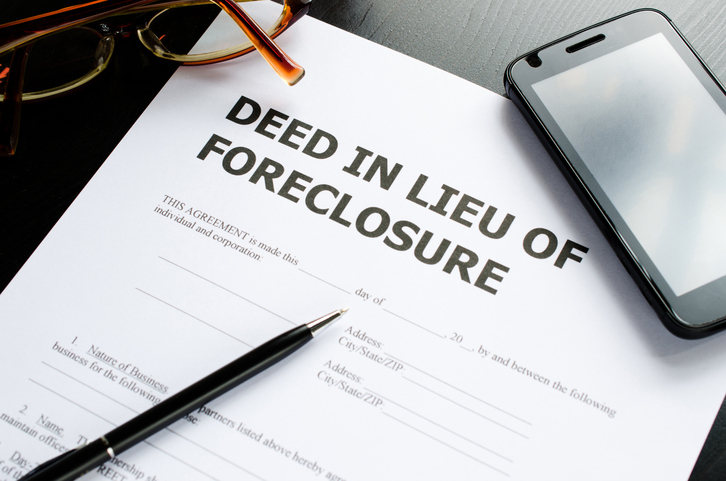Facing financial hardship and the possibility of losing your home can be an overwhelming and stressful experience. When homeowners are unable to keep up with their mortgage payments, they may be forced to consider options such as foreclosure or a deed in lieu of foreclosure. While both options can have significant consequences, a deed in lieu of foreclosure offers a voluntary alternative that allows homeowners to transfer their property to the lender in exchange for being released from their mortgage obligations. Speak to a financial advisor to know what’s best for you, but here’s how the deed in lieu of foreclosure works.
How a Deed in Lieu of Foreclosure Works
A deed in lieu of foreclosure is a legal agreement in which a borrower voluntarily transfers the title of their property to the lender in exchange for a release from their mortgage obligations. This process differs from a traditional foreclosure, where the lender initiates legal proceedings to take possession of the property due to the borrower’s default on mortgage payments.
In a deed in lieu of foreclosure, the borrower offers the deed to the lender, thereby avoiding the lengthy and costly judicial foreclosure process. A borrower might choose this option when facing financial hardship and wanting to avoid the more severe consequences of a traditional foreclosure.
To qualify for a deed in lieu of foreclosure, borrowers must meet several eligibility criteria:
- Genuine financial hardship: The borrower must demonstrate a legitimate financial hardship that prevents them from making mortgage payments, such as job loss, medical emergencies or divorce. Examples of genuine financial hardship may include long-term unemployment, significant medical bills, or a drastic reduction in income due to a change in family circumstances.
- Clear property title: The property must be free of other liens or encumbrances, as the lender will want to ensure a clear title upon taking ownership.
- Attempt to sell the property: The borrower must have made a good faith effort to sell the property through traditional means, such as listing it with a real estate agent, before pursuing a deed in lieu of foreclosure. Lenders require this to ensure that the borrower has exhausted all other options for avoiding foreclosure.
- Sufficient property value: The lender will assess the property’s value to ensure that it is sufficient to cover the outstanding mortgage balance.
- Willingness to transfer ownership: The borrower must be willing to voluntarily transfer the property deed to the lender and vacate the premises promptly.
In some cases, the lender may require the borrower to attempt a short sale before agreeing to a deed in lieu of foreclosure. While a deed in lieu of foreclosure can be a viable solution for some borrowers facing foreclosure, you should carefully consider your specific financial situation and explore all available options before making a decision.
When a Deed in Lieu of Foreclosure Is Typically Needed

A deed in lieu of foreclosure is a legal agreement in which a homeowner voluntarily transfers the title of their property to the lender in exchange for the cancellation of their mortgage debt. This option may be considered by homeowners facing financial hardship or imminent foreclosure. Here are some common reasons people choose this option:
- Bad market conditions: In some cases, homeowners may find themselves unable to sell their property or refinance their mortgage due to market conditions or a decline in property value.
- Consequences of foreclosure: A deed in lieu of foreclosure can also be a last resort for homeowners facing imminent foreclosure and seeking to avoid the negative consequences associated with the foreclosure process. The specific negative consequences of foreclosure include a substantial drop in credit score, often ranging from 100 to 300 points, which can take years to recover from.
- Other financial struggles: Whenever you struggle financially it could be difficult to keep the costs of your home going. The reasons for financial struggles could be nearly unlimited but can all lead to the same place, which is giving up the home instead of getting foreclosed on.
Pros and Cons of a Deed in Lieu of Foreclosure
While a deed in lieu of foreclosure can provide some relief to homeowners in financial distress, it is essential to carefully weigh the advantages and disadvantages before pursuing this option. Homeowners should consider factors such as the impact on their credit score, potential tax implications and the loss of their property when making a decision. It is crucial to understand that a deed in lieu of foreclosure is not a guaranteed solution and requires lender approval.
One of the primary advantages of opting for a deed in lieu of foreclosure is the ability to avoid the public record of a foreclosure on their credit report. While a deed in lieu of foreclosure will still negatively impact credit scores, the damage is typically less severe than a foreclosure. Another potential benefit is the possibility of receiving relocation assistance from the lender. Some lenders may offer cash incentives or assistance to help cover moving expenses and provide a financial cushion during the transition, though this is less likely for many.
One of the primary drawbacks of a deed in lieu of foreclosure is the loss of the homeowner’s property. By voluntarily transferring ownership to the lender, homeowners forfeit any equity they may have built in the home and will need to find alternative housing arrangements. Homeowners may also face potential tax implications as a result of a deed in lieu of foreclosure. In some cases, the forgiven debt may be treated as taxable income by the IRS.
Bottom Line

Facing foreclosure can be a challenging experience for homeowners. Therefore, knowing your available options, such as a deed in lieu of foreclosure, can help provide you a path forward. By carefully weighing the pros and cons of a deed in lieu, and considering alternative solutions like loan modifications, short sales, forbearance agreements and bankruptcy, homeowners can make informed decisions to protect their financial well-being and potentially keep their homes.
Tips for Investing in Real Estate
- If you are considering a real estate investment, a financial advisor can help you determine how it fits into your financial plan. Finding a financial advisor doesn’t have to be hard. SmartAsset’s free tool matches you with up to three vetted financial advisors who serve your area, and you can have a free introductory call with your advisor matches to decide which one you feel is right for you. If you’re ready to find an advisor who can help you achieve your financial goals, get started now.
- You may want to use a mortgage calculator if you’re planning on buying real estate soon to estimate how much you could pay for your new property each month.
Photo credit: ©iStock.com/maybefalse, ©iStock.com/miniseries, ©iStock.com/andreswd
